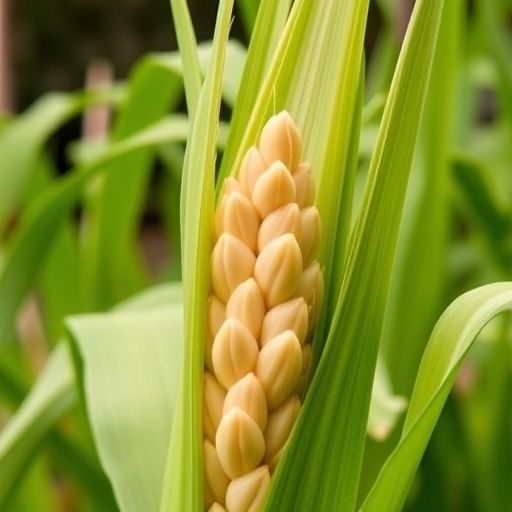In a groundbreaking study conducted by Wang et al., the intricate relationship between drought stress and gene expression in maize has been brought to the forefront of agricultural genomics. The research highlights specific genes within the ZmATG18 subfamily that could potentially revolutionize how we approach drought resistance in crops. This topic is particularly relevant given the increasing challenges posed by climate change, where drought conditions are becoming increasingly prevalent globally.
Drought stress has long been recognized as a significant factor affecting crop yield and food security. As populations grow and climate conditions become more unpredictable, the agricultural community is under immense pressure to develop crops that can withstand these challenges. Within this study, the researchers have delved into the maize genome, focusing on the ZmATG18 gene family to identify its role in the plant’s response to drought. This work paves the way for gene editing technologies that could bolster drought resistance in maize and other crops.
The ZmATG18 gene subfamily consists of several members that have varying functions related to autophagy, a crucial cellular process for plant survival under stress conditions. Autophagy is vital for recycling cellular components and managing the overall health of the plant. In scenarios where water is scarce, autophagy becomes even more critical. Wang et al. have successfully identified the specific functions of these genes, with a spotlight on ZmATG18a, which appears to be particularly instrumental during periods of drought.
Through a detailed comparative genomic analysis, the authors have not only elucidated the individual roles of the various ZmATG18 genes but also examined their evolutionary significance in the context of maize adaptation to changing environmental conditions. Understanding these evolutionary trajectories can provide insights into how maize has historically coped with abiotic stressors, which is essential for future breeding programs.
To conduct their study, Wang and colleagues employed a combination of bioinformatics tools and experimental validation techniques. Large datasets were analyzed to pinpoint the expression patterns of ZmATG18 genes under controlled drought conditions. The researchers also utilized transcriptome sequencing, which allowed for an in-depth examination of gene expression levels in varying water conditions, revealing intricate networks of gene regulation that respond to drought stress.
The findings suggest that ZmATG18a plays a pivotal role in not only enhancing drought tolerance but also facilitating the overall growth and development of maize plants during adverse conditions. By influencing key biochemical pathways, ZmATG18a acts as a regulator of stress responses, impacting other genes involved in metabolism, cell signaling, and stress adaptation. This complex interplay signals the potential for engineering maize varieties that can thrive even when faced with severe drought.
In an era where sustainable agriculture is paramount, this research opens doors to innovative breeding techniques. The application of gene-editing tools such as CRISPR-Cas9 could enable scientists to enhance the expression of ZmATG18a in maize, thereby elevating the plants’ resilience to drought. Early-stage trials suggest that maize varieties with heightened ZmATG18a expression show improved root systems and water retention capabilities, which could lead to significant gains in yield under limited water supply.
Beyond the immediate agricultural implications, the ramifications of this research extend to broader ecological considerations. As we face the reality of climate change, highly drought-resistant maize could contribute to sustainable food production systems that minimize reliance on water resources. This aligns with global efforts to address food security while safeguarding our natural ecosystems.
In addition to practical agricultural applications, understanding the molecular basis of drought response through studies like this contributes to fundamental plant biology. It fuels our understanding of how plants adapt to their environment at the genetic level, providing valuable information that can be applied beyond maize to other staple crops. This knowledge is essential as we strive to increase global food production to meet the demands of an ever-growing population.
Furthermore, the identification of the ZmATG18 subfamily highlights the importance of functional genomics in crop improvement. The ability to dissect the roles of specific gene families allows researchers to prioritize targets for breeding and genetic engineering. It fosters collaborations between geneticists, agronomists, and environmental scientists, all working together toward a common goal: ensuring the resilience of our food systems against the backdrop of a changing climate.
As the findings of this study continue to resonate throughout the scientific community, it remains crucial to disseminate this knowledge effectively. The agricultural sector must embrace advancements in genetic research to implement innovative strategies that mitigate the impacts of drought. Educational outreach and collaboration between researchers, farmers, and policymakers can drive the adoption of these new approaches in real-world farming practices.
In summary, the work conducted by Wang et al. significantly advances our understanding of drought stress resilience in maize through the exploration of the ZmATG18 gene subfamily. Their comprehensive analysis not only identifies specific gene functions but also propels the conversation forward on sustainable agricultural practices amid climate uncertainties. As the scientific community continues to build upon these findings, the future of crop resilience in the face of drought appears promising.
Indeed, we are witnessing a new dawn in agricultural science, where the intersection of genomics and environmental adaptations is paving the way for a more sustainable and food-secure future. This research serves as a reminder of the power of science to address some of the most pressing challenges facing our global community today.
Subject of Research: The role of ZmATG18 subfamily genes in maize drought stress response.
Article Title: Identification of the ZmATG18 subfamily genes in maize and the role of ZmATG18a in drought stress.
Article References:
Wang, Z., Luo, F., Meng, C. et al. Identification of the ZmATG18 subfamily genes in maize and the role of ZmATG18a in drought stress.
BMC Genomics 26, 777 (2025). https://doi.org/10.1186/s12864-025-11910-5
Image Credits: AI Generated
DOI: 10.1186/s12864-025-11910-5
Keywords: ZmATG18, drought stress, maize, gene expression, autophagy, genetic engineering, sustainable agriculture.




